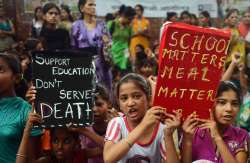2013 Bihar midday meal tragedy: How Principal’s neglect left 23 children dead
After almost four years of the tragic incident, the officer-in-charge of the probe recollected the events of July 16, 2013, giving an idea how the school principal’s ‘negligence’ took the lives of 23 children.

The midday meal scheme – launched across India to serve nutritious meals in government schools with the minimum content of 300 calories and 8-12 gm of protein – turned out to be one of the most tragic incidents in Bihar in July 2013 when at least 23 children had died of food poisoning after eating a midday meal.
On July 16, 2013, children aged between four and 12 ate the midday meal at a government primary school in Dharmashati Gandaman village. After half an hour, they complained of stomach ache, had diarrhoea and started vomiting.
While 16 children, between classes I to V, died on the spot, four were declared dead upon arrival at the hospital, and the others died while in the hospital.
The incident led to a huge uproar as villagers took to the streets in many parts of the district in protest and the Bihar Police was under “tremendous pressure” to establish foul play in the tragedy.
After almost four years of the tragic incident, the officer-in-charge of the probe recollected the events of July 16, 2013, giving an idea how the school principal’s ‘negligence’ took the lives of 23 children.
According to him, the investigations only showed “criminal negligence” on the part of the school principal, said Vinay Kumar, additional director-general of police, CID, in an interview to The Indian Express.
“That day, Meena Devi, the principal of Gandaman primary school in Bihar’s Saran district, had planned to distribute free government textbooks to about 100 children studying in Classes 1 to 5. The school was running in a community hall measuring 30 ft by 20 ft. An open part of the verandah was being used as the midday meal kitchen,” Vinay Kumar told The Indian Express.
Meena’s husband, Arjun Rai, had announced to the children and their parents that books would be distributed, and almost three times the usual number of 30-40 students had turned up. The midday meal menu was rice and soyabean curry that day.
Arjun, a farmer, had decided to grow sugarcane that year, and had purchased monocrotophos, a cheap but acutely toxic toxic organophosphate agricultural insecticide. He had kept the container on the verandah of their house, some 600 metres from the school, the official informed.
“Meena asked one of the two school cooks to bring the container of mustard oil from the verandah, which had no separately marked space for the midday meals groceries,” said Kumar.
“The cook saw two similar containers. Arjun Rai had brought two litres of monocrotophos, an agricultural pesticide, from the neighbouring Sidhwalia Sugar Mill for his sugarcane crop. Monocrotophos resembles mustard oil. Instead of picking up the container of mustard oil, the cook picked up the one containing monocrotophos,” he added.
When the oil was put on the fire, it turned black. The two cooks and some students found this unusual and reported to the principal about this. Principal Meena Devi, however, dismissed their concerns, saying old mustard oil can turn black with heat.
The ‘midday meal’ eventually turned into a horrific incident leaving 23 children, aged between 6 and 12 years, dead.
The CID officers, from the residue sample of the cooked soyabean from utensils, established the presence of the pesticide. It was known that Arjun Rai had procured monocrotophos for his sugarcane crop.
“We were under tremendous pressure to prove foul play. Rai could have added monocrotophos to the container of mustard oil. But his only mistake was to keep the pesticide container in the vicinity of the mustard oil container,” said Kumar.
“It was criminal negligence on the part of the school principal, who should have responded to the complaints of the cooks and the students,” he added.
The Criminal investigation Department (CID) of the state police exculpated the Arjun Rai for buying the pesticide that made its way into the meal.
Accepting the CID’s supervision note, an additional judge in Chhapra, Saran, in August 2016 convicted the principal, Meena Devi, and sentenced her to two jail terms of 10 years and seven years, to run consecutively rather than concurrently.